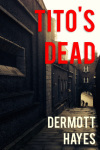Embrace the Criticism and Learn
Two weeks ago, I asked friend, writer and fellow blogger, Tanya Cliff, to take any story of mine and critique it using the criteria she would use to determine, what is a story? https://dermotthayes.com/2016/06/01/what-makes-a-story-guest-writer-tanya-cliff/
I wanted to make a point about the value of criticism and how it is something we should embrace and learn from. To continue that theme, here is my own tuppence worth on the value of criticism and how we should use it to our advantage.
This is, I hope, the beginning of an open ended discussion, so please, feel free to comment and participate.
When you send two stories out and one of them comes back, rejected, do you throw it away and rage against its scorner? Don’t.
Take a long, close look at it. Compare the two; why one was accepted, the other, rejected. Try to find out why one was considered good enough for the publication and why the other was not.
Ask any artist, they rarely remember the good reviews, it’s the bad ones they keep close to their hearts. If they’re sensible, they look upon it with dispassion and detachment (a difficult thing) and learn from it.
Criticism can be harsh and hard to take. Don’t take it personally. Embrace it and learn from it because if you don’t, you’re doing a disservice to yourself.
The problem with criticism is it has two meanings.
In the Oxford English Dictionary (http://www.oxforddictionaries.com/definition/english/criticism), like most other dictionaries, criticism is, first, an expression of disapproval on the basis of perceived faults or mistakes and then, the analysis and judgement of the merits and faults of an artistic and literary work.
I’ve been on both sides of this fence. For most of my adult life, I worked as a freelance journalist, a frequently misunderstood career choice. I wished I had the freedom to choose what I wanted to write about but more often and more pointedly, I wrote about what people wanted to read about.
I also wrote when or where others would not. Why? Because I had to put food on the table for my family. From a very early time in my career, which began as a financial journalist writing share reports and attending corporate AGMs, I was a rock critic. Why? Because I saw a niche in the market and jumped in to fill it. And who said you can’t have fun while you’re working?
Back then, I had ten years behind me as someone who worked on the fringes of the entertainment industry, helping out in school and college shows and occasionally performing, as an actor. I’ve never played a musical instrument or performed, alone, in front of an audience but I was that eager, young fool, front of stage, watching everything, thrilled and enthralled.
So I wrote reviews of rock concerts because newspapers bought them and I got to see some great shows and got paid, too. The first person to question my right to do so was another rock journalist. He said I knew nothing about rock music because I couldn’t play an instrument and had never played in front of an audience.
There were harsh words exchanged but it made me question my right and ability to continue doing what I was doing. Here’s what I concluded. Every potential consumer is a critic, by definition. No-one has to spend five years in a musical conservatory or assembling drum kits and humping guitar amps in Wideass, Minnesota, to know and decide what they like and what they don’t.
On the other hand, an eclectic knowledge and experience of music, performed and recorded, were criteria, I believed, necessary to perform my task. You also needed the facility to communicate and share that information. Now I’d been listening to music since I first heard The Beatles perform their first single on BBC’s Top of the Pops, in 1963.
Winston Churchill said ‘criticism may not be agreeable, but it is necessary.’ He went to say it fulfills the function of pain in the body, ‘it calls attention to an unhealthy state of things.’
All criticism is subjective and that’s an easy way to dismiss it, at its harshest but a good critic must carry the responsibility of his or her task, as seriously as the artist: they must know what they’re talking about.
As a freelance journalist, I relied on being able to read my market to sell my stories. That meant knowing what I was writing about, first, but also, knowing how to communicate and share it. So, as a critic, I was obliged to learn, not just about the artist I might critique but also about who was listening to them and where their work came from.
In other words, I was ‘the man on the Clapham Omnibus’, Joe Soap, Paddy the Punter saying ‘entertain me’ and listening to The Jam’s fervent assertion,
Two lovers kissing masks a scream of midnight
Two lovers missing the tranquility of solitude
Getting a cab and travelling on buses
Reading the grafitti about slashed-seat affairs
I say that’s entertainment
Now, my life as a critic was not confined to rock music. I was also, a literary critic, specialising in historical biographies and crime and science fiction because those were three areas of commercial writing in which I had a personal interest. But beggars can’t be choosers and occasionally, a literary editor would ask me to review something that was outside my usual stream of work.
I remember, on one occasion, getting a new novel, written by a very well known playwright. I thought it was awful; hackneyed, clichéd, unimaginative and frankly, tired. Unfortunately, my review turned out to be the worst review the book received with many of the better known critics choosing to simply ignore the book or write critiques that were ‘mildly indifferent’ to the book’s obvious, I felt, faults.
Five years later, I attended a reception in a theatre where most of this writer’s plays were produced. A statue and plaque, in his honour, were being dedicated and he was there, too. After the speeches, I went up to pay my respects and was rebuffed, to the surprise and embarrassment of the hosts. The playwright refused to shake my hand and reminded me of that critique. It didn’t bother me, I wrote an honest review. He could take it or leave it.



Since then, as a writer, I’ve become more used to rejection and criticism than I ever was as a freelance journalist. But then, the criteria for me then was, if it sells, then it’s right.
Unfortunately, for an artist, such adherence to commercial imperatives, is neither feasible nor acceptable. An artist has a distinctive voice. An artist is also a communicator. The artist’s raison d’être is to communicate with an audience in that distinctive voice so that people can see and interpret the world they live in, from a different perspective.
But that should never exclude an artist from embracing criticism, since criticism can provide them (the artist) with a way to see their work from a different perspective and by so doing, help them learn to communicate better.


Postcard from a Pigeon
- Dermott Hayes's profile
- 4 followers



